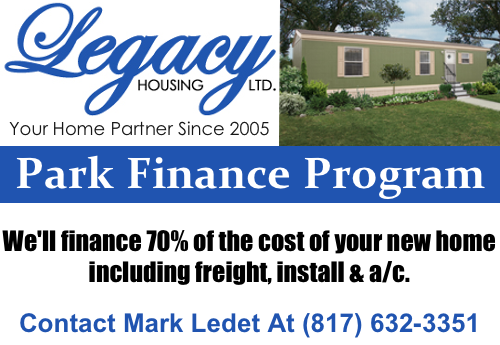If you’ve ever read a biography on Conrad Hilton, the founder of the largest U.S. hotel chain, you know the quote “to launch big ships, you have to go where the water is deep”. This is what Hilton’s mother told him when he felt that he had fallen into a rut of operating a tiny hotel in a tiny west Texas town with little future to it. And this quote is a good theme for anyone looking at buying a mobile home park.
You have to be in a big market
Hilton’s first hotel was in Cisco, Texas, and is called the Mobley Hotel. It’s still there, now serving as the office for the Chamber of Commerce. The first thing you notice about Cisco is that it’s a dump of a town. Always has been. Hilton bought the hotel in 1919, and the population was around 4,000. Today, the population is still around 4,000. You are in the middle of nowhere, with no appreciable employment base of reason to stop by. Hilton’s mother was a great forecaster of population trends apparently, as she recognized that Cisco was dead end even back in the 1920’s. By the term “the water’s deep” she meant that Hilton needed to find a market with a bigger population and a bigger future than little Cisco had to offer. And the same is true of mobile home parks. Successful mobile home parks traditionally are located in markets large enough to have a diverse employment base and high housing costs.
You have to have a larger park
When Hilton’s mother said “big ships”, she meant larger properties. The Mobley Hotel only has about 20 rooms. That’s not a large enough hotel to make any real money, which she knew. By comparison, Hilton’s second hotel was 14 stories in heights and had 325 guest rooms, located in Dallas. The same is true with mobile home parks. To hit sufficient scale to make a mobile home park work effectively, you need at least 25 lots or more, and around 100+ works even better.
You have to take some risk
Hilton’s mother’s comment of “the water’s deep” also refers to risk. You can’t drown in shallow water, but you can in deep water. So she meant that he had to take some risk if he wanted to make big money. Up until that time, Hilton had bought his little hotel with mostly cash – and not much of it. He had a pretty low-stress existence, but it was not exciting or satisfying for him. Hilton’s mother encouraged him to stick his neck out a little more, and that’s what lead to the Hilton hotel empire. With mobile home parks, the same holds true. You can buy that little 10-space park for $50,000, but is that really what you want out of your life? Or should you leave your comfort zone for a bigger opportunity?
You have to understand and succeed at financial leverage
Here’s one area that you can do a better job of than Hilton did. When Hilton started “launching big ships” he did so with incredibly risky leverage. Rather than buy existing hotels at cheap prices, he elected to build super-expensive hotels from scratch, and to pile on debt. As a result, he lost everything during the Great Depression. From that experience, he formed his own quote for his new empire “never build anything new, just wait until a depression and buy it for a penny on the dollar”, which is exactly what he did, buying back his own hotels – and many others – during the Depression for a fraction of what they cost to build. Any good mobile home park owner needs to understand the risk of excess leverage, as well as the skill to obtain decent loans. You can’t launch big ships with cash only, but you also need to understand how to do it so the ship does not sink.
Hilton’s career should be an example to everyone
If you’ve never read Hilton’s biography, I heartily recommend it to anyone. What makes the story so interesting is the surprise ending: how we lost everything during the Depression and then pulled out of his slump and built the largest hotel empire in the U.S. through skill and tenacity. He learned the importance of buying great assets cheap as turnarounds – something we have always been huge advocates of as a business model.



